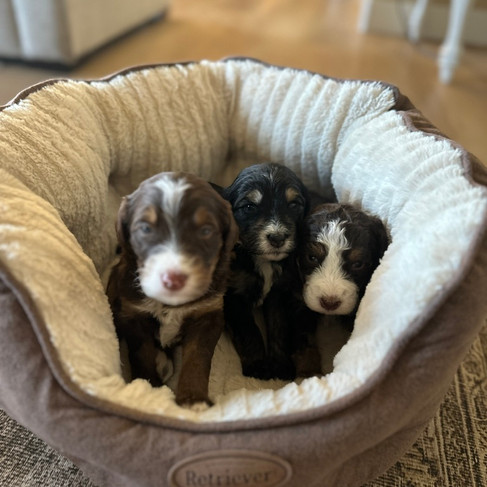Unveiling the Genetics Behind Rare Red Bernedoodles
- shellyskuza
- Oct 12, 2024
- 3 min read

Introduction

When I first learned about Bernedoodles, I saw tons of Black Tri-Color coats. This makes sense because half of a Bernedoodle's lineage comes from Bernese Mountain Dogs. Their beautiful coats typically feature a black base with tan points above their eyebrows, on their cheeks, chest, and legs, along with white markings on their chest and forehead.

Over time, however, more coat color variations have started to appear in Bernedoodles. Poodles, known for their colorful coats, have introduced a wider range of colors and patterns into Bernedoodles, giving us the vibrant variety we see today.
Understanding Red Bernedoodle Genetics
Thanks to DNA testing, we now understand how different traits combine to create these unique coat colors and patterns.
Red coats, for example, come from recessive genes, which must be inherited from both parents. In dog genetics, we refer to this as ‘ee’. The E locus in the DNA determines whether a dog carries the gene for a red coat. If a Bernedoodle has at least one dominant E (as in EE or Ee), it won’t appear red. However, if both parents pass down the recessive e gene, their offspring will have an ‘ee’ genotype and will display a red coat. I explain how combinations of letters get passed down here.
If a dog is ‘ee,’ it won’t have any black hairs on its body. This is because ‘ee’ prevents the production of eumelanin, the pigment responsible for black and brown colors. While the red coat is a genetic mutation, it doesn’t harm the dog in any way—it simply affects the color.
Factors Influencing Color Variations
In the picture above, all the puppies are from the same litter, but their colors vary. Both parents carry the Ee genotype, meaning each puppy had a chance to inherit either a dominant E or a recessive e gene from each parent.
The puppies on the left inherited the recessive ‘e’ gene from both parents, giving them ‘ee’ coats.
The puppies on the right inherited at least one dominant E gene, resulting in EE or Ee coats, which are not red.
If both parents have ‘ee’ coats, all of their puppies will also be ‘ee’ and will inherit red or cream coats.
It’s important to note that red Bernedoodles won’t always have bright red coats—they can also appear in light cream or white with subtle hints of red. Additionally, puppies with ‘ee’ coats won’t have tan points, as the red coloring overrides any tan markings that might otherwise appear.
Cryptic Merle in Red Coats
Merle Bernedoodles have their original black or brown coats lightened in certain areas, resulting in unique, mottled patterns. While merles can come in red, it’s impossible to see the merle pattern on a red-coated dog because the ‘ee’ gene hides the merle’s visual appearance.
This is where cryptic merle comes into play. If a red Bernedoodle carries a hidden merle gene (called a cryptic merle), it won’t show on their coat, making it risky to breed with another merle. DNA testing is essential before breeding a red Bernedoodle with a merle Bernedoodle to avoid the dangerous consequences of breeding two merles together, which can result in severe health issues for the puppies.

Conclusion
While I originally favored merle Bernedoodles, I quickly fell in love with red-coated puppies when they appeared in my litters. I enjoy having a variety of colors in my puppies because it allows me to offer beautiful dogs for any preference that future owners might have. With every litter, I look forward to seeing what unique colors and patterns will show up next!



















Comments